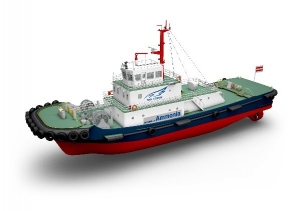


(Posted on 28/10/21)
NYK Line, Japan Engine Corporation, IHI Power Systems Co., Ltd., and Nihon Shipyard Co., Ltd. Have announced that Japan’s New Energy and Industrial Technology Development Organization (NEDO) has approved the Companies’ participation in a demonstration project for the commercialization of vessels equipped with a domestically produced ammonia-fueled engine as part of the Green Innovation Fund project. The demonstration project, which is scheduled to begin in December with ClassNK added to the Companies, aims to use ammonia as fuel to significantly reduce greenhouse gas (GHG) emissions during voyages and thus introduce an ammonia-fueled vessel for the good of society earlier than 2030. The Companies will eventually work toward the goal of achieving zero emissions from ships in the future.
The Companies and ClassNK's greatest goals are to realize the development of an ammonia-fueled vessel that is internationally competitive ahead of other countries, and to lead the development of safety guidelines and laws and regulations related to ammonia-fueled vessels. In order to achieve these goals, marine engine manufacturers, shipyards, class societies, and shipping companies in Japan will work together to consistently cooperate from the research and development stage to engine development, shipbuilding, and commercialization.
With the entry into force of the Paris Agreement in 2016, the global momentum for decarbonization is increasing. The Japanese government has declared that it will reduce GHG emissions to zero as a whole by 2050 and aim for carbon neutrality, and the energy shift toward the realization of a carbon-free society is accelerating. Reducing GHG emissions is also an urgent issue in the shipping industry, and research and development is being conducted to convert marine fuel from conventional heavy fuel oil to liquefied natural gas (LNG) and to popularize next-generation zero-emission fuels such as hydrogen and ammonia. Ammonia does not emit carbon dioxide (CO2) even when burned, so it is expected to be a next-generation fuel that contributes to global warming countermeasures. Furthermore, it is said that by utilizing CO2-free hydrogen** for hydrogen, which is the raw material for ammonia, it is possible to achieve zero emissions in consideration of the fuel life cycle.
Under this background, Japan’s Ministry of Economy, Trade and Industry started the Green Innovation Fund project toward carbon neutrality by 2050, and NEDO has now approved the Companies' development of vessels equipped with a domestically produced ammonia-fueled engine as part of the Green Innovation Fund project.
AtoB@C Shipping, a subsidiary of ESL Shipping, has announced the successful delivery of Fleximar, the... Read more
Western Bulk, together with reputable Norwegian partners A/S J. Ludwig Mowinckels Rederi, Premium Maritime... Read more
Pacific Basin Shipping Limited, one of the world’s leading dry bulk shipping companies, has announced... Read more
Columbia Group anticipates a period of strong expansion as an increasing number of international shipowners... Read more
Norse?Ship Management has expanded its use of Smart Ship Hub’s high frequency sensor data and... Read more
As the maritime industry gears up to welcome the IMO’s STCW bullying and harassment training amendments... Read more
NORDEN has acquired the cargo activities of Taylor Maritime in Southern Africa (previously operated... Read more
Philippos Ioulianou, Managing Director of EmissionLink, has warned the IMO’s decision to delay... Read more
VIKAND has highlighted the need for cultural change in the maritime sector as reports of bullying, harassment... Read more
The maritime industry is experiencing a period of significant transformation, driven by rapidly evolving... Read more